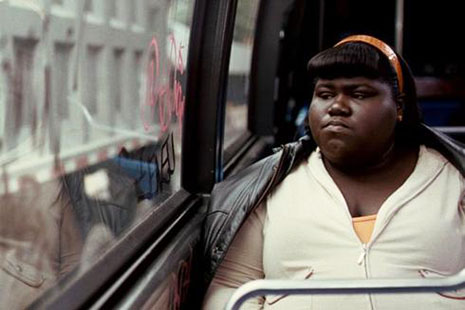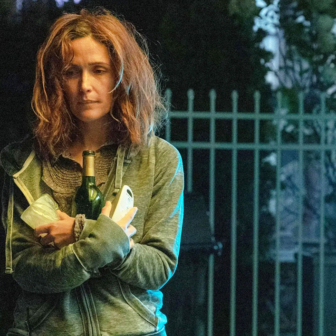JACQUES Audiard’s A Prophet, which is lasting longer at a scattered few cinemas than anyone thought likely for a long French gaol-flick, is the shortest two and a half filmic hours I can remember; it’s at once riveting and relentless. It is also the ultimate social scientist’s movie in its delineation of a character shaped and developed by the group, the institution, the prevailing norms and unwritten rules.
After a stoush with the police – we don’t see the details – nineteen-year-old Malik El-Djebena (Tahar Rehim), a drifting French-Arab boy who never knew his parents, gets a six-year prison term. He comes in as a dumb adolescent, and learns in short order that he won’t survive the gaol-yard or the cells without “protection.” This is offered by the old boss, César Luciani (Niels Arestrup, long-serving character actor and the film’s only familiar face). It’s kill or be killed; Malik is instructed in the position of the victim’s jugular vein, and provided with a single double-edged razor-blade. To gain entry to the cell in question, he has to hold it in his mouth. Ironies build up; Malik doesn’t want to do this, and he sits dumbly while his victim, Reyeb, talks to him about books and learning.
On plot level, that’s the beginning, and what unfolds is the tale of the way “a clueless kid” – in Jonathan Romney’s summation in the Independent – turns into “a Machiavellian prince.” Malik changes, and is changed, complicated and hardened. He learns to read and write; for a time he is César’s creature, and a creature of their world, in which conformity can make room for hatred and rising rebellion. Drug-dealing is core business, but power-play as such comes first. The scenes of brutality within the gaol make the Abu Ghraib images seem quite mild in retrospect. But Abu Ghraib was always somewhere else; with this film, fiction as it is, there’s a two-way flow, made visible and palpable in the details of setting and incident, between the prison and the outer world; the boundaries dissolve. This is a terrible prison, and it’s part of normality.
César has his networks outside, and involves Malik in their operations; what matters there is the young crim’s fresh experience of the middle-class world – suits and ties, plane rides and airports; the synthetic bonhomie of airline staff; the sight of expensive Parisian shop-windows; the extraordinary moment when, somewhere around Marseille, Malik stands in the water and looks out at the sea. Audiard and his cinematographer, Stéphane Fontaine, exercise the closest grip on action and environment, on looks and faces, wrestling bodies in vicious fights or (infrequent) sex, prison routines with food and washing. We become alert to the choreographies of the prison yard, and the gestural ways in which the various racisms play out, with the Corsicans hating the Muslim prisoners, the dominant French despising the rest; the Muslims are courteous, prayerful, perilously separate.
There’s no easy symbolism here, and this is not a redemption story, though the elements are given space: Malik’s love for a dead comrade’s child, his capacity for dreams and visions, the hint of a family-centred future. The ghost of the man he murdered comes back, a kind of counsellor. But by the time he’s released, all the plot-lines have thickened; he can reject César, move on, taking his skills and opportunities beyond the limits of this story. There’s room for argument on the import of the ominous final images. Over those, we hear “Mack the Knife” sung in English; I thought the tune, without the words, would have been quite enough to suggest Malik’s future.
Some commentators are invoking Scorsese’s Goodfellas, but this crime thriller works in a very different, Mediterranean framework. A Prophet is fiction; the prison is a huge, built and structured set; the credits for carpenters, painters, armies of assistants roll on and on; a small army of real-life ex-cons had jobs on screen and off. But with all that there is still a documentary level, a drive for truth which has to do with France in the present, indeed with a Europe where populations are shifting, refugees are many and desperate, and the First World – at least the European part of it – is having a hard time hanging on to its boundaries. They’ll soon have to let Turkey in.
Lee Daniels’s Precious is the feel-good movie of the moment. Allow yourself the pleasure, which is well-earned in the sights and sounds we must confront before Claireece Precious Jones (Gabourey Sidibe), poor, black, sixteen and seriously obese, finds resolution enough to pull her life together. Paul Byrnes, in the Sydney Morning Herald, has marked the film down for indulging stereotypes about Afro-American life at the bottom of the heap; but the seasoned producer-director Daniels, helped on by Oprah Winfrey among others, has told interviewers that he picked up Sapphire’s novel, Push, because of what he saw and felt as its truth. There’s no nonsense about film-fiction and social reality being separate worlds either; Daniels also says that he hopes the film provokes open discussion and increased concern, about incest, sexual abuse, teenage pregnancy and illiteracy.
Precious, when we meet her, suffers from all of those, along with an indolent wreck of a mother (Mo’nique) who is beyond appalling; she’d rather her daughter hung round the welfare office than persisted with schooling. Just to give the stereotypes a special twist, the beautiful teacher, Miz Blu Rain (Paula Patton) turns out to be a lesbian. Precious draws enough strength from herself, Blu Rain and a welfare officer – played with wonderful, unglamorous grit by Mariah Carey – to come through, and claim the two babies she’s had by her own father. With them, she disappears into a Harlem crowd; we are left with no idea how she’s going to manage, but she will. One kind of motherhood is rejected, another kind affirmed. With all that’s new and unlikely in Precious – like a 350-pound black girl as heroine – we still have one of the oldest Hollywood fairytales, the underdog scrambling out of the debris, and it still works.
We’re in no position to critique it for stereotyping; stereotypes and their stories matter crucially in entertainment films because they provide for recognition. Precious plays in Australia in inner-city cinemas, in once-grotty, now-trendy neighborhoods, to mostly white, culturally privileged audiences who, when they see New York, don’t generally walk around Harlem. (I did that once, but I had the luck to be in the company of a black Australian friend.) The Dendy and Nova audiences like to imagine that racism is somehow over. It’s not; and Precious should be shown in any movie-house where black Australians can watch it. I hope especially that it gets to the riverbed cinema in Alice. •





